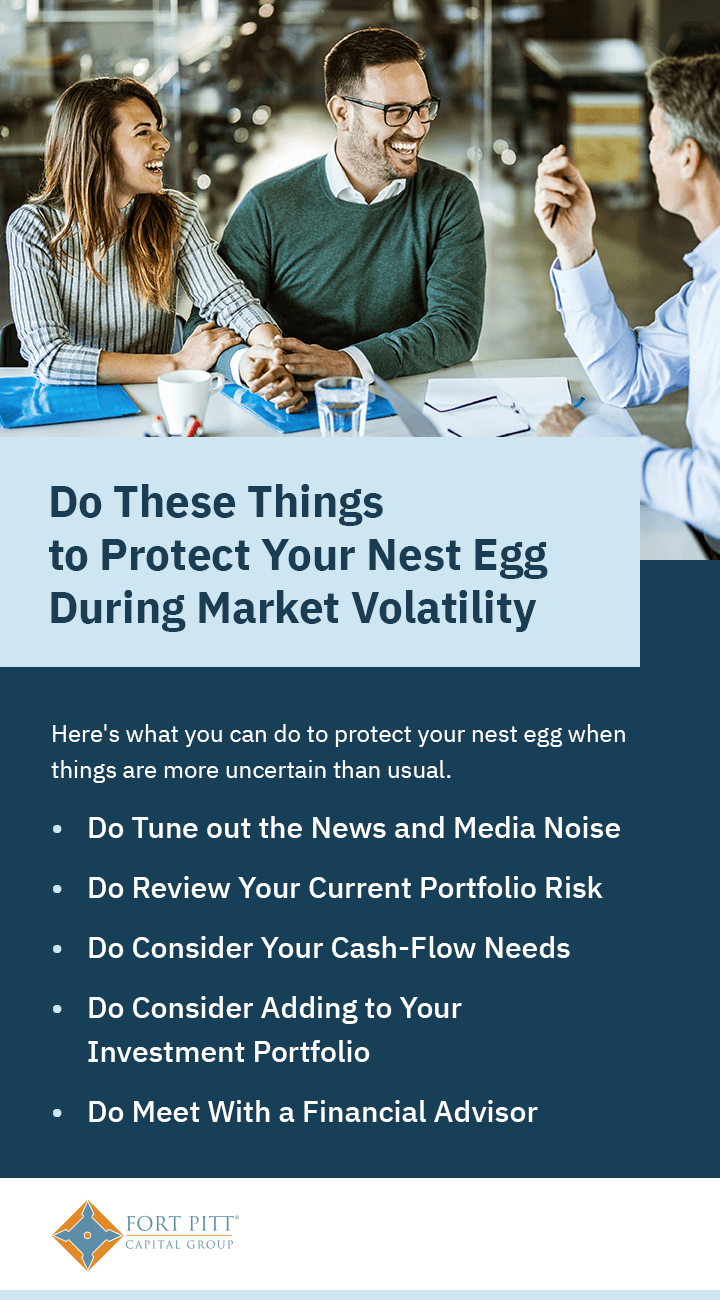How to Protect Your Nest Egg in a Volatile Market


Written by: Nathan Boxx, AIF®, CFP® | Director of Retirement Plan Services
In a perfect world, your investments’ value would always increase without taking the occasional dip or dive. Reality can be a little different than the ideal, though. Investment values do increase, but they can also drop due to market changes. While risk is part of the process of investing for the future, it’s worth remembering that, from a historical point of view, market returns are usually positive in the long run.
Even if you tell yourself that market ups and downs are part of investing, seeing your portfolio take a hit can be a nail-biting experience. Here’s what you can do to survive market volatility, protect your nest egg and safeguard your sanity in an unpredictable world.
What Is Market Volatility?
Market volatility is how much the returns on investments vary from the average over a given period. One way to measure volatility is to compare two different stocks against each other. For example, the price of Stock 1 might remain reasonably stable, increasing slightly over 12 months. Meanwhile, the cost of Stock 2 might jump by 20% in a month, fall by 10% over the next two months, then jump up another 20% over the next few months before dropping again. Compared to the first stock, the second stock is more volatile.
You can also measure volatility by looking at the market as a whole and comparing it to the average performance. If the market was relatively stable for several years, then started to fluctuate notably, it’s a volatile market. Though market volatility isn’t necessarily harmful, it can be nerve-wracking to watch, especially if you’re keeping a close eye on your portfolio’s performance.
What Causes Market Volatility?
Several factors can contribute to market volatility. One factor is changes in supply and demand. When there is a lot of demand for a particular stock, meaning more investors want to purchase it than there are shares available, the stock price is likely to rise. If more shares become available than there are investors who want to buy, the share price tends to drop.

Market cycles can also affect volatility. When prices are going up generally, it’s a bull market. Often, something called a correction happens during a bull market. During a correction, prices tend to drop as much as 20%. Market corrections can be hard to predict and often depend on investors getting skittish or fearful.
A bear market is the opposite of a bull market. During a bear market, stock prices drop by 20% or so and stay low for an extended period. The dive in prices spurs people to panic, often causing them to sell their investments and pushing prices down further.
Do These Things to Protect Your Nest Egg During Market Volatility
If the market is going up and down and making you nervous, the most important thing to do is to keep calm. A volatile market might be the ideal time to make adjustments to your portfolio, invest in more stocks or leave things alone.

Here’s what you can do to protect your nest egg when things are more uncertain than usual.
1. Do Tune out the News and Media Noise
Turn on cable news or read a financial magazine amid a market downturn, and you’re likely to think that the entire world is about to come to an end. Every new bear market seems to signal everything has come crashing down.
The reality is that the media tends to play up downturns, often to sell more copies or make their programs look more attractive to advertisers. Drama sells, so a news program or magazine is likely to emphasize market changes to get attention and to affect people’s emotions. If you see a news report that’s making dire warnings about the state of the market, your best bet is to change the channel or turn the TV off entirely. Don’t make decisions about your financial future based on what a TV anchor tells you.
2. Do Review Your Current Portfolio Risk
If you’re feeling uncertain amid a volatile market, you might want to take a step back and take a look at what’s going on in your portfolio. You might have purchased your investments years ago when you were in a different phase in your life. Maybe your current asset allocation no longer works for your goals.
For example, if you’re getting nearer to retirement, you might decide you want to shift some of your investments away from the stock market and into assets that are generally more stable or lower risk. Even if you’re still decades away from retiring, having a diversified portfolio can be the way to go. Diversification, meaning you have a mix of different types of assets, can help you weather the ups and downs of a volatile market.
3. Do Consider Your Cash-Flow Needs
If you’re investing to save for retirement, you might not yet need to take distributions from your portfolio to pay for your everyday expenses. But if you are using the funds in your portfolio as an income source, it’s crucial to pay attention to your cash flow and needs, especially during a market downturn. If you take a distribution from the portfolio when prices are down, it can take longer to regain its principal value.
Try to hold off on taking any distributions from your portfolio until things have stabilized. You might use another income source — such as funds in a savings account that have remained unaffected by market volatility or income from a part-time job — to tide you over until things have settled down.
4. Do Consider Adding to Your Investment Portfolio
The old cliche “buy low and sell high” applies when there’s some volatility in the market. One way to think of a correction is as stocks going on sale. Their prices are low enough that you could earn a considerable return once the market stabilizes.
Buying stocks and adding to your portfolio when things are down can seem counterintuitive. If you’re nervous about losing money, one option is to invest funds in your portfolio that you won’t need in an emergency. Try setting up a recurring contribution so that you are steadily adding to your portfolio, whether the market is up or down.
5. Do Meet With a Financial Advisor
A financial advisor can help calm some of your concerns amid a volatile stock market. If you work with an advisor who’s also a fiduciary, they have a legal responsibility to ensure the recommendations they make to you are in your best interests. A fiduciary advisor has a duty of care to you, meaning they must put your needs before theirs. They also have a duty of loyalty to you, meaning they can’t recommend investments that would provide them with a specific financial benefit or that would present a conflict of interest.
Meeting with a financial advisor is a good idea if you already have a portfolio and would like to update it to better suit your current situation. It’s also wise to meet with a financial advisor if you haven’t yet started to plan for retirement or put together a financial plan at all.
To Protect Your Nest Egg During Market Volatility, Don’t Do These Things
Emotions can run high when the market is taking a dip or during a correction. You can mitigate portfolio losses as a result of inevitable market volatility by avoiding the following mistakes:
1. Don’t Panic Sell
It’s relatively typical for people to panic when they see the value of their portfolio edging downward. You might notice the value of several investments drop and start to feel nervous. Some of the thoughts that might run through your head are, “I should sell now to avoid future losses” or “I should sell and invest in something else.”
Often, when one investor is panicking about the market, many others are, too. The resulting alarm can further push down prices, which can result in a panic sale that essentially locks-in the loss on their investments. Instead of selling when you see prices start to drop, hold steady. Now might even be a good time to invest more, as prices are low.

2. Don’t Try to Predict or Time the Markets
The media makes a game of trying to predict what’s going to happen next in the market. Flashing headlines on cable news channels tell would-be investors to buy “this stock that’s about to take off!” or to “avoid these investments.”
One adage to remember when investing is that there’s no surefire way to predict anything. A stock could perform well one day and take a nosedive the next. It’s also hard to predict when the best day is to purchase stocks. If you’re looking for the lowest possible price, you might never see it and can miss out on investing entirely.
Instead, take a long-term look at the markets. Buy low when possible, but don’t get so focused on getting the lowest price or waiting for the market to bottom out that you never invest at all.
Be Aware of Your Market Biases
Making investment decisions can seem like a black-and-white, either/or scenario — either you invest in a stock or you don’t. However, emotional or behavioral bias can enter the picture, making it more challenging to make a calm and rational decision about your money.
Recognizing common behavioral biases and knowing how to work around them can help you make sound decisions about your financial future.
- Myopic loss aversion: It’s natural to want to avoid loss as much as possible, and it’s common to try to avoid loss so much that you also miss out on gains. Myopic loss aversion takes a nearsighted approach to minimizing loss. You’re focusing so much on the potential for losing money that you miss out on the ability to gain. One way to reduce this bias is to take a step back and examine your portfolio as a whole. One investment might be down, but gains from the others might counter it.
- Recency bias: With recency bias, you focus on the market’s recent actions and assume they will carry on in the future. To counter this bias, remind yourself that past events don’t necessarily influence what will happen in the future.
- Confirmation bias: If you have a confirmation bias, you look for clues and evidence to support your theory, effectively confirming your beliefs are correct. For example, if you think the market is headed for a downturn, you’ll focus on signs that stocks are dropping, possibly ignoring the stocks that are doing well or overall gains in the market.
- Breakevenitis: When investors suffer from “breakevenitis,” they sell their investments once they’ve balanced out rather than holding their stocks and hoping that the market will continue to improve. Ultimately, they don’t end up earning money or turning a profit. As stocks start to climb, it’s usually better to hold on to them rather than sell right away.
Market Volatility FAQ
Working with a financial advisor can help you hold steady and protect your nest egg through the market’s ups and downs. As you start to work with an advisor, it can be helpful to have answers to a few of the most frequently asked questions about volatility.
- What is a bull market? A bull market is a period during which market prices increase. It usually lasts for some time, but volatility can disrupt it, causing prices to dip.
- What is a bear market? When the market drops by 20% and remains there for an extended period, it moves from being a bull market to being a bear market. Usually, bear markets trigger investor panic, which can further push prices down. Fortunately, bear markets tend to last for less time than bull markets.
- How do you measure market volatility? You can measure volatility by comparing the market’s current conditions to benchmark or average conditions. You can also measure volatility by comparing the fluctuations in different stock prices. A stock that holds relatively steady is less volatile than one that moves up and down. Often, stocks are more volatile when they are new and become more stable over time.
- How long does market volatility last? The good news about market volatility is that it usually doesn’t last long. Bear markets are historically much shorter in duration than bull markets. For example, the bear market during the COVID-19 pandemic was the shortest ever, lasting just 33 days.
Talk With an Advisor at Fort Pitt Capital Group
Working with a financial advisor who has your best interests at heart can help you weather the market’s ups and downs. Fort Pitt Capital Group’s advisors are fiduciaries who work in your interests and ensure that they make recommendations that put your needs first. Contact us today to learn more about our financial advisory and wealth management services for individuals.
About the Author:
Nathan Boxx, AIF®, CFP®
Director of Retirement Plan Services
Fort Pitt Capital Group, LLC
680 Andersen Drive, Pittsburgh, PA 15220
(412) 921-1822 | nboxx@fortpittcapital.com


